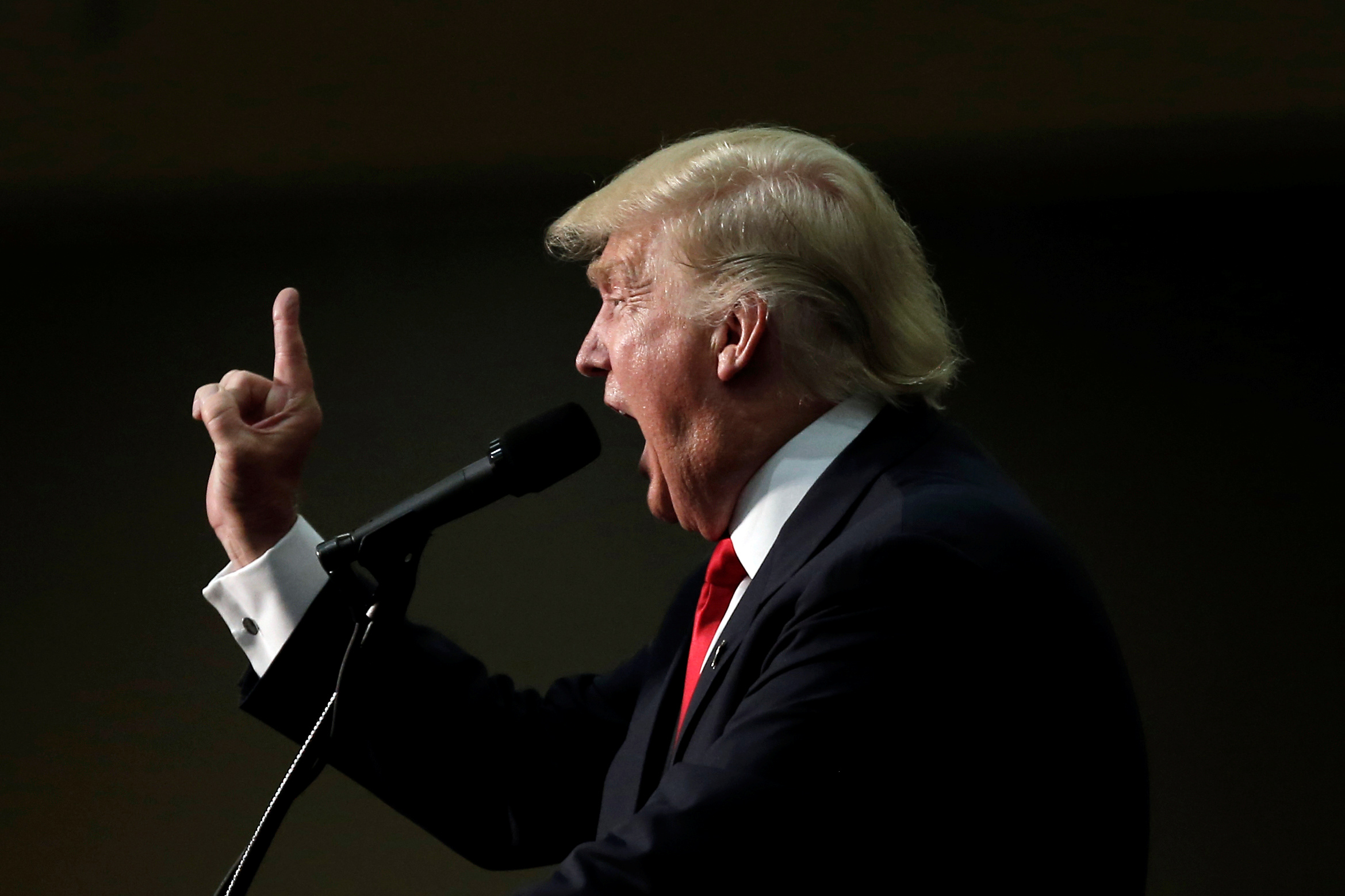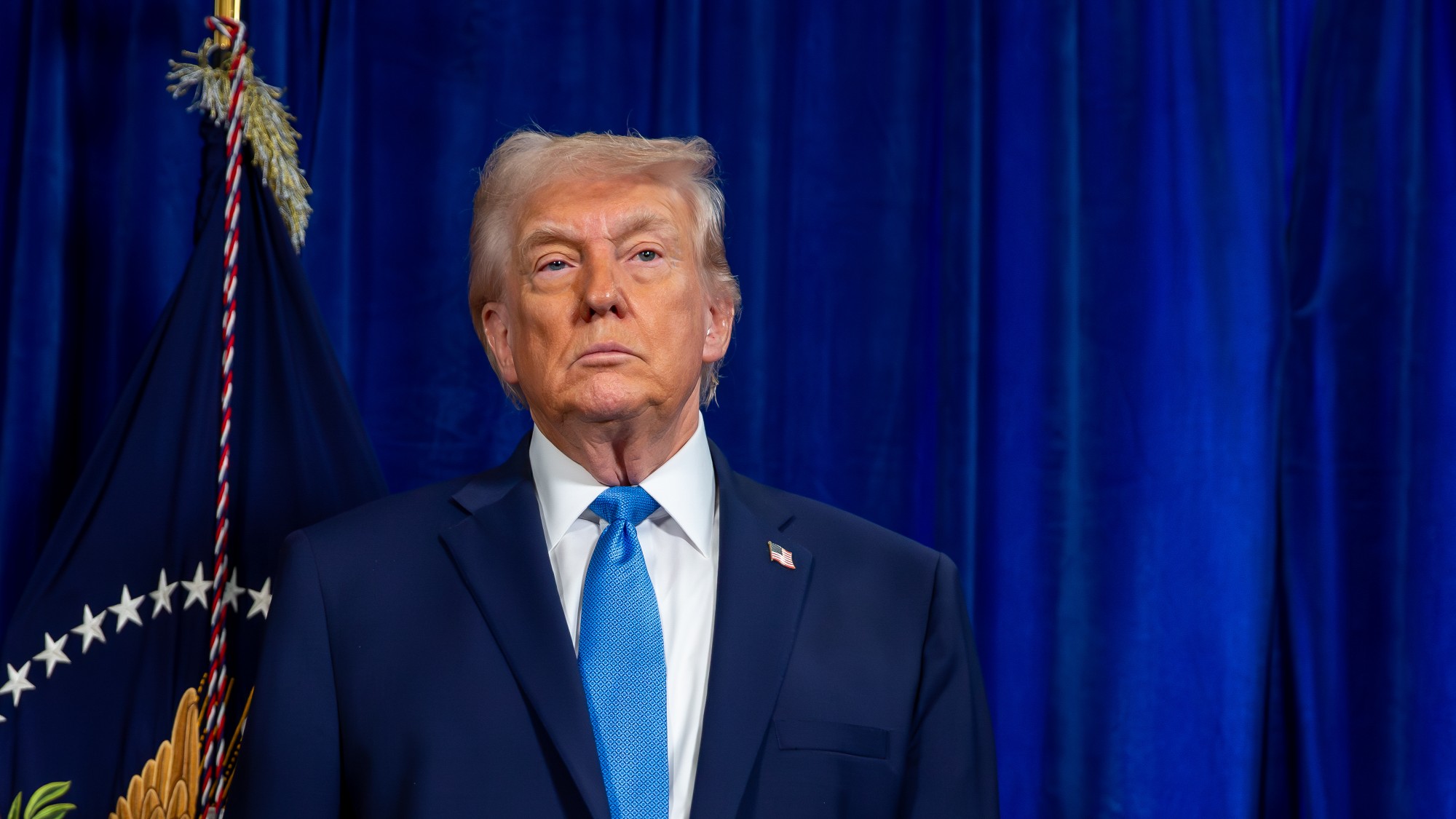Why President Trump's raging bombast is no match for dry legal procedure
There's something particularly satisfying about Trump getting walloped by the courts

A free daily email with the biggest news stories of the day – and the best features from TheWeek.com
You are now subscribed
Your newsletter sign-up was successful
How do you defeat a tyrant?
It's always satisfying to imagine winning a decisive battle that destroys not just an opposing force, but its guiding philosophy. Think of The Lord of the Rings' Éowyn declaring "I am no man" as she kills the leader of the Nazgûl, or Luke Skywalker using the Force to destroy the Death Star — or, more recently, Rogue One's Jyn Erso using the power of a strategic data leak to defeat the Empire. In the stories we seek comfort in during the bleakest times, we remind ourselves that victory can be not just material, but philosophical: Justice prevails. Love trumps hate.
But the execution is often more complicated — and in this case, those who see President Trump as a tyrant who must be toppled can benefit from the fact that he understands his role in terms of sweeping narrative, rather than prosaic fact. On Thursday, after the 9th U.S. Circuit Court of Appeals upheld a lower court ruling that suspended his executive order — widely interpreted as a "Muslim ban" — Trump depicted himself in the position of the underdog hero, tweeting "SEE YOU IN COURT, THE SECURITY OF OUR NATION IS AT STAKE!"
The Week
Escape your echo chamber. Get the facts behind the news, plus analysis from multiple perspectives.

Sign up for The Week's Free Newsletters
From our morning news briefing to a weekly Good News Newsletter, get the best of The Week delivered directly to your inbox.
From our morning news briefing to a weekly Good News Newsletter, get the best of The Week delivered directly to your inbox.
Since his inauguration, he has attempted to impose his policies largely via executive order: the kind of political maneuvering that can be easily described in headline form, and easily understood by the public. Even more than their stated goals — to build a wall between the U.S. and Mexico, to ban Syrian refugees from entering the country, and to ban entrance into the United States of both immigrants and visitors from seven Muslim-majority countries — these executive orders communicate the way President Trump sees himself: as a strongman.
But, unfortunately for him, that role is one the American government does not afford, and his satisfaction in issuing an uncompromising executive order may be blunted as the public gradually recognizes a pattern: Whatever policy Trump plans to enact will be challenged, delayed, and ultimately altered by the American judiciary. There are, as it turns out, three branches of government, and not just one.
"What is our country coming to when a judge can halt a Homeland Security travel ban and anyone, even with bad intentions, can come into U.S.?" Trump wondered on Twitter on Feb. 4, after federal Judge James Robart filed an action challenging Trump's executive order to ban the entrance of all travelers coming from Iraq, Syria, Sudan, Iran, Somalia, Libya, and Yemen. The question implicit in Trump's response was, of course: What is our country coming to when a judge can render judgment on a legal matter? It is a question with some historical basis, though perhaps one best ignored by anyone attempting to defend the president's logic.
For Trump, the question of what the country is coming to is only growing more complicated. On Feb. 8, the news broke that his Supreme Court nominee, Neil Gorsuch, reportedly referred to Trump's comments about Judge Robart as "disheartening" and "demoralizing" — and on Feb. 9, Trump watched judges from the 9th U.S. Circuit Court of Appeals argue that his own campaign rhetoric could be used to disprove his claim that his executive order did not constitute a "Muslim ban." Of particular interest to the court was his statement, in December 2015, that he wanted to institute "a total and complete shutdown of Muslims entering the United States."
A free daily email with the biggest news stories of the day – and the best features from TheWeek.com
Does Trump even remember making such a statement? Does he remember anything he says after he gives a speech? Often, his greatest campaign victories seemed to come during the moments when he submitted to the will of the crowd in some way, when he sensed what angers and anxieties the people massed around him seemed to feel, and promised to avenge it. The theatrical side of politics has always been Trump's forte. Called on to name his role model during an interview with Playboy in 1990, he replied:
I could say Winston Churchill, but … I've always thought that Louis B. Mayer led the ultimate life, that Flo Ziegfeld led the ultimate life, that men like Darryl Zanuck and Harry Cohn did some creative and beautiful things. The ultimate job for me would have been running MGM in the '30s and '40s — pre-television. There was incredible glamour and style in those days that's gone now. And that's when you could control situations. [Playboy]
When Donald Trump decided to run for president, he used his already staggering power to reach for a position he must have believed would serve to bring him more — one that would give him the complete creative control he seemed to long for.
Now, he has just begun to realize that the control offered even by the Oval Office has little to do with theatrics, and a great deal to do with the complicated, unglamorous, and often vexingly inconclusive letter of the law. With his campaign, he attempted to will himself into a grand narrative, one in which he could play the hero, or at least the unstoppable tyrant.
Instead, he has found himself trapped in a legal brief.
Sarah Marshall's writings on gender, crime, and scandal have appeared in The Believer, The New Republic, Fusion, and The Best American Nonrequired Reading 2015, among other publications. She tweets @remember_Sarah.
-
 Touring the vineyards of southern Bolivia
Touring the vineyards of southern BoliviaThe Week Recommends Strongly reminiscent of Andalusia, these vineyards cut deep into the country’s southwest
-
 American empire: a history of US imperial expansion
American empire: a history of US imperial expansionDonald Trump’s 21st century take on the Monroe Doctrine harks back to an earlier era of US interference in Latin America
-
 Elon Musk’s starry mega-merger
Elon Musk’s starry mega-mergerTalking Point SpaceX founder is promising investors a rocket trip to the future – and a sprawling conglomerate to boot
-
 The billionaires’ wealth tax: a catastrophe for California?
The billionaires’ wealth tax: a catastrophe for California?Talking Point Peter Thiel and Larry Page preparing to change state residency
-
 Bari Weiss’ ‘60 Minutes’ scandal is about more than one report
Bari Weiss’ ‘60 Minutes’ scandal is about more than one reportIN THE SPOTLIGHT By blocking an approved segment on a controversial prison holding US deportees in El Salvador, the editor-in-chief of CBS News has become the main story
-
 Has Zohran Mamdani shown the Democrats how to win again?
Has Zohran Mamdani shown the Democrats how to win again?Today’s Big Question New York City mayoral election touted as victory for left-wing populists but moderate centrist wins elsewhere present more complex path for Democratic Party
-
 Millions turn out for anti-Trump ‘No Kings’ rallies
Millions turn out for anti-Trump ‘No Kings’ ralliesSpeed Read An estimated 7 million people participated, 2 million more than at the first ‘No Kings’ protest in June
-
 Ghislaine Maxwell: angling for a Trump pardon
Ghislaine Maxwell: angling for a Trump pardonTalking Point Convicted sex trafficker's testimony could shed new light on president's links to Jeffrey Epstein
-
 The last words and final moments of 40 presidents
The last words and final moments of 40 presidentsThe Explainer Some are eloquent quotes worthy of the holders of the highest office in the nation, and others... aren't
-
 The JFK files: the truth at last?
The JFK files: the truth at last?In The Spotlight More than 64,000 previously classified documents relating the 1963 assassination of John F. Kennedy have been released by the Trump administration
-
 'Seriously, not literally': how should the world take Donald Trump?
'Seriously, not literally': how should the world take Donald Trump?Today's big question White House rhetoric and reality look likely to become increasingly blurred